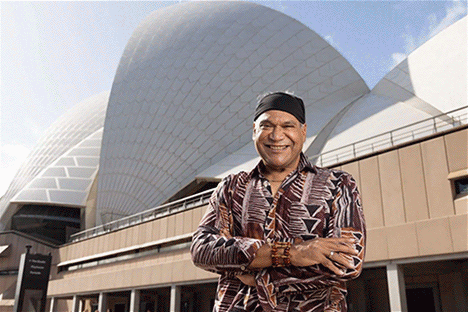Godfather of Aboriginal cuisine takes indigenous produce to the world

The godfather of Aboriginal cuisine in Australia, Mark Olive, spoke recently with the South China Morning Post (SCMP) about taking indigenous Australian cuisine and its unique flavours to the rest of the world.
The Bundjalung man from Wollongong is one of the country’s best known and best loved chefs and has been running his “Black Olive” restaurants for close to 30 years, as well as hosting various food-related TV programs.
He is best known for promoting and introducing the food of indigenous peoples.
Olive spoke to SCMP while visiting Hong Kong recently to help launch Festival of Australia, a month-long showcase of Aussie ingredients and produce.
“At the moment, it’s still very Australian-centric,” Olive says of indigenous ingredients and produce.
“You do have places overseas now starting to pick up on our indigenous herbs, especially things like the lemon myrtle and wattleseeds. But the variety in our whole selection of herbs is huge.
“I was the first Aboriginal person to come out with a cooking degree in the early ’80s. It was way before all of these herbs were even available, so I had to do a lot of research,” he told SMCP.
He said that as a lot of Aboriginal history was lost, he did about 10 years of research before being able to bring it all together.
Olive trained in European cuisine under an Italian chef. In the 1990s, he began to introduce native Australian produce to his meals and the word started to spread about his pioneering endeavours.
“We’re the only country that eats the animals on our coat of arms [a kangaroo and an emu]. Why not? They’re tasty. It’s just too bad a lot of people won’t eat them,” Olive said.
“Our proteins are amazing. Kangaroo and emu are extremely lean, so it’s very good protein. There’s hardly any fat and they’re extremely high in iron.
“I cook wallaby like osso buco [an Italian veal dish]. It’s spectacular. The wallaby is like the veal of kangaroos. Even possum is lovely.”
He uses Australia’s unique proteins through classic cooking.
“I would do a kangaroo mignon, wrapping the meat with a smoked emu instead of bacon, and sit it on a native spinach that is toxic unless you process and cook it.
“All the flavours would be totally different. I also do a lasagne with crocodile meat. People thought it was chicken. They look like Western dishes, but all the flavours are different and Aboriginal.”
Olive is showcasing this and more during the Festival in Hong Kong, where he has been joined by several Australian hospitality doyens including Shane Osborn of Arcane.
“Shane is amazing,” Olive says. “I think the way Australia is now, it’s starting to really realise that we have a viable culture. First Nations people have something unique to offer the world. I’ve seen the change in attitude. It’s become more mainstream since [indigenous foods and herbs were used on] MasterChef Australia. It has had an impact around the world,” he told SCMP.
“Right now, we send more kangaroo and crocodile meat overseas than we use in our own country. It was only in 1993 that they decriminalised the use of kangaroo [for human consumption]. You couldn’t buy it in supermarkets before. It wasn’t farmed.
“Nobody was doing what I was doing before. But a lot of communities are very proud of what I’ve done. I feel I have become a role model for Aboriginal Australia.”
Jonathan Jackson, 9th October 2023







